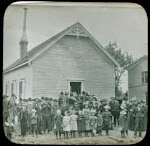I spent a lot of time, several hours, turning pages in my "sources" binders looking for points we omitted that we may wish to include in volume one. I haven't found much. So far, all I've found is a place where we need to add a sentence or footnote for clarity. We quote one of the major characters self-description of a fall on a slippery, iron sidewalk door. He connected the fall to Scripture. We failed to explain that this fell into the pattern of American Calvinist thought. Scholars call this the Type-Antitype approach. Some of my readers know in a limited fashion what that is. Puritans and Calvinistic Separatists took that concept beyond the covers of the Bible, and saw Bible verses as finding fulfilment in daily life.
The Bible's concept of type and antitype, as used by Paul, is that Old Testament scripture sometimes foreshadowed later events. Paul used this process to suggest that Sarah and Hagar represented two covenants. The anonymous writer of Hebrews (Some think that's Paul.) uses the type-antitype method of exegesis to state that the Law of Moses forshadowed the Christian polity and the method of salvation.
American Calvnists went beyond that.Deborah Madsen tags this as "spiritual interrogation of events." [See her American Exceptionalism.] She quotes the well known passage from Governor Winthrop's Journal:
"At
Watertownthere was (in the view of divers witnesses), a great combat between a mouse and a snake; and, after a long fight, the mouse prevailed and killed the snake. The pastor of
Boston, Mr. Wilson, a very sincere, holy man, hearing of it, gave this interpretation: That the snake was the devil; the mouse was a poor contemptible people, which God had brought hither, which should overcome Satan here, and disposes him of his kingdom. Upon the same occasion, he told the governor, that, before he was resolved to come to this country, he dreamed he was here, and that he saw a church arise out of the earth, which grew up and became a marvelous goodly church."
Russell's interpretation of dreams and daily events in the light of scripture comes from this herritage.
We should have included that point. We will in some fashion.



No comments:
Post a Comment